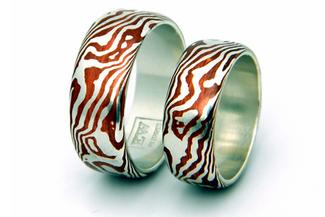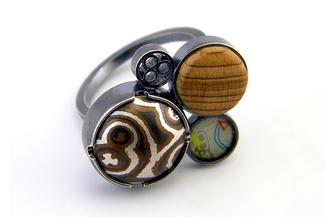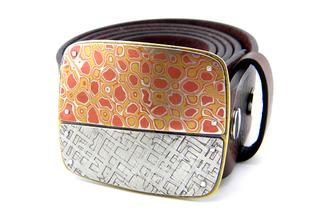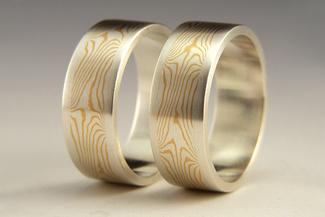Small Scale Mokume Gane
Mokume-gane, or wood grain metal, is a traditional Japanese technique in which two or more different metals are cleaned, alternately stacked, clamped and heated to a high temperature. The result is the fusing of all layers into a solid block of metal, or billet. The billet can be made into patterned sheet metal by repeatedly carving through layers and reducing the thickness. Ring stock can be made by removing a section, twisting, and carving to produce an organic pattern. The name literally means "wood pattern metal" which describes the organic shapes different layers of metal create when formed into decorative sheet.
Through a series of demonstrations and hands-on practice, participants will learn a low tech, low cost, and efficient method for making Mokume Gane. Techniques demonstrated include fusion & diffusion bonding, seamless ring fabrication, Mokume Gane patterning, as well as various metalsmithing and jewelry techniques (including sawing, forging, and soldering) pertinent to the process.
The workshop begins with each student producing a 16 layer billet with copper and sterling silver. The metal will be fired in refractory kiln brick furnaces with soldering torches as the heat source, which is easy to recreate in home studios!
Over the course of the workshop, participants will move on to fabricate a seamless Mokume Gane forged band ring. Leftover material will be made into patterned sheet metal that can be incorporated into future work. The goal is to thoroughly understand the process for creating Mokume Gane and gain new fluency with the material under the guidance of an experienced teacher and artist.
If you'd like to see more of Eric's work, please visit his website ericburrisjewelry.com
Meet the instructor

Eric Burris is a metalsmith and jeweler who constructs sculptural jewelry, influenced by nature, architecture, travel, and the materials themselves. He combines wood with Mokume Gane; they complement each other visually, but contrast in terms of natural vs. man-made. Maps are incorporated to offer visual clues and add color.
Eric has been making things out of metal and teaching others how to do the same for over twenty years. He has a BFA from Kansas State University and an MFA from Arizona State University. He’s also been employed as a bench jeweler, an adjunct instructor at multiple colleges, and sold his jewelry nationally at fine craft shows. During graduate school he was hooked on the Japanese technique, Mokume Gane. By combining traditional and western methods he’s developed a low tech and efficient method of making diffusion bonded Mokume Gane. Eric thrives on sharing his metal working experiences and travels around the country teaching workshops. He has also made a living working with dogs as an amateur dog trainer and operating a dog walking business. He lives in Maryland with his printmaker partner, Gretchen and their dog Javier."
Materials & Tools
There is a required materials fee of $85 that is payable upon registration. The materials kit includes the following:
- wood/brass cleaning jig
- cleaning blocks w/scotch-brite pads
- 320 grit emery paper
- 2oz pumice powder
- steel torque plates w/hardware
- a 6" x 2" sheet of both 20g sterling silver and 20g copper
- #2/0 and #4 saw blades
For an additional $60, students have the option to purchase a "mini furnace" (used to fire the billets) directly from the instructor after the workshop ends. Students are not required to purchase this items because it will be available to use at class, but you may choose to purchase a custom-build one from him for use after the workshop.
- close toed shoes
- apron
Metalwerx has hand tools available for use during class, but students may have to share. Please bring the following if you have them.
- Any flex shaft burs you already have for patterning sheet
- basic hand tools(saw, files, sand paper, scribe, ruler). You are welcome to bring your favorite things that you commonly use and would like to have on hand at class.
- leather work gloves
- safety glasses & ear protection, but we definitely have some to borrow.





